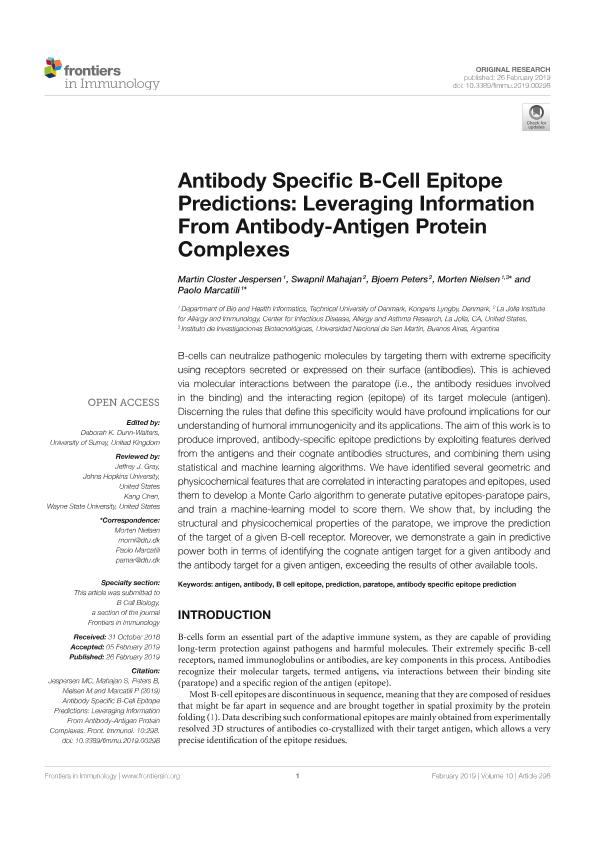Mostrar el registro sencillo del ítem
dc.contributor.author
Jespersen, Martin Closter
dc.contributor.author
Mahajan, Swapnil
dc.contributor.author
Peters, Bjoern

dc.contributor.author
Nielsen, Morten

dc.contributor.author
Marcatili, Paolo
dc.date.available
2020-12-21T18:10:07Z
dc.date.issued
2019-02
dc.identifier.citation
Jespersen, Martin Closter; Mahajan, Swapnil; Peters, Bjoern; Nielsen, Morten; Marcatili, Paolo; Antibody specific B-cell epitope predictions: Leveraging information from antibody-antigen protein complexes; Frontiers Media S.A.; Frontiers in Immunology; 10; FEB; 2-2019; 1-10
dc.identifier.issn
1664-3224
dc.identifier.uri
http://hdl.handle.net/11336/120962
dc.description.abstract
B-cells can neutralize pathogenic molecules by targeting them with extreme specificity using receptors secreted or expressed on their surface (antibodies). This is achieved via molecular interactions between the paratope (i.e., the antibody residues involved in the binding) and the interacting region (epitope) of its target molecule (antigen). Discerning the rules that define this specificity would have profound implications for our understanding of humoral immunogenicity and its applications. The aim of this work is to produce improved, antibody-specific epitope predictions by exploiting features derived from the antigens and their cognate antibodies structures, and combining them using statistical and machine learning algorithms. We have identified several geometric and physicochemical features that are correlated in interacting paratopes and epitopes, used them to develop a Monte Carlo algorithm to generate putative epitopes-paratope pairs, and train a machine-learning model to score them. We show that, by including the structural and physicochemical properties of the paratope, we improve the prediction of the target of a given B-cell receptor. Moreover, we demonstrate a gain in predictive power both in terms of identifying the cognate antigen target for a given antibody and the antibody target for a given antigen, exceeding the results of other available tools.
dc.format
application/pdf
dc.language.iso
eng
dc.publisher
Frontiers Media S.A.

dc.rights
info:eu-repo/semantics/openAccess
dc.rights.uri
https://creativecommons.org/licenses/by/2.5/ar/
dc.subject
ANTIBODY
dc.subject
ANTIBODY SPECIFIC EPITOPE PREDICTION
dc.subject
ANTIGEN
dc.subject
B CELL EPITOPE
dc.subject
PARATOPE
dc.subject
PREDICTION
dc.subject.classification
Otras Ciencias de la Salud

dc.subject.classification
Ciencias de la Salud

dc.subject.classification
CIENCIAS MÉDICAS Y DE LA SALUD

dc.title
Antibody specific B-cell epitope predictions: Leveraging information from antibody-antigen protein complexes
dc.type
info:eu-repo/semantics/article
dc.type
info:ar-repo/semantics/artículo
dc.type
info:eu-repo/semantics/publishedVersion
dc.date.updated
2020-11-16T20:39:21Z
dc.journal.volume
10
dc.journal.number
FEB
dc.journal.pagination
1-10
dc.journal.pais
Estados Unidos

dc.description.fil
Fil: Jespersen, Martin Closter. Technical University of Denmark; Dinamarca
dc.description.fil
Fil: Mahajan, Swapnil. La Jolla Institute for Allergy and Immunology; Estados Unidos
dc.description.fil
Fil: Peters, Bjoern. La Jolla Institute for Allergy and Immunology; Estados Unidos
dc.description.fil
Fil: Nielsen, Morten. Consejo Nacional de Investigaciones Científicas y Técnicas. Centro Científico Tecnológico Conicet - La Plata. Instituto de Investigaciones Biotecnológicas. Universidad Nacional de San Martín. Instituto de Investigaciones Biotecnológicas; Argentina. Technical University of Denmark; Dinamarca
dc.description.fil
Fil: Marcatili, Paolo. Technical University of Denmark; Dinamarca
dc.journal.title
Frontiers in Immunology
dc.relation.alternativeid
info:eu-repo/semantics/altIdentifier/doi/http://dx.doi.org/10.3389/fimmu.2019.00298
dc.relation.alternativeid
info:eu-repo/semantics/altIdentifier/url/https://www.frontiersin.org/articles/10.3389/fimmu.2019.00298/full
Archivos asociados
